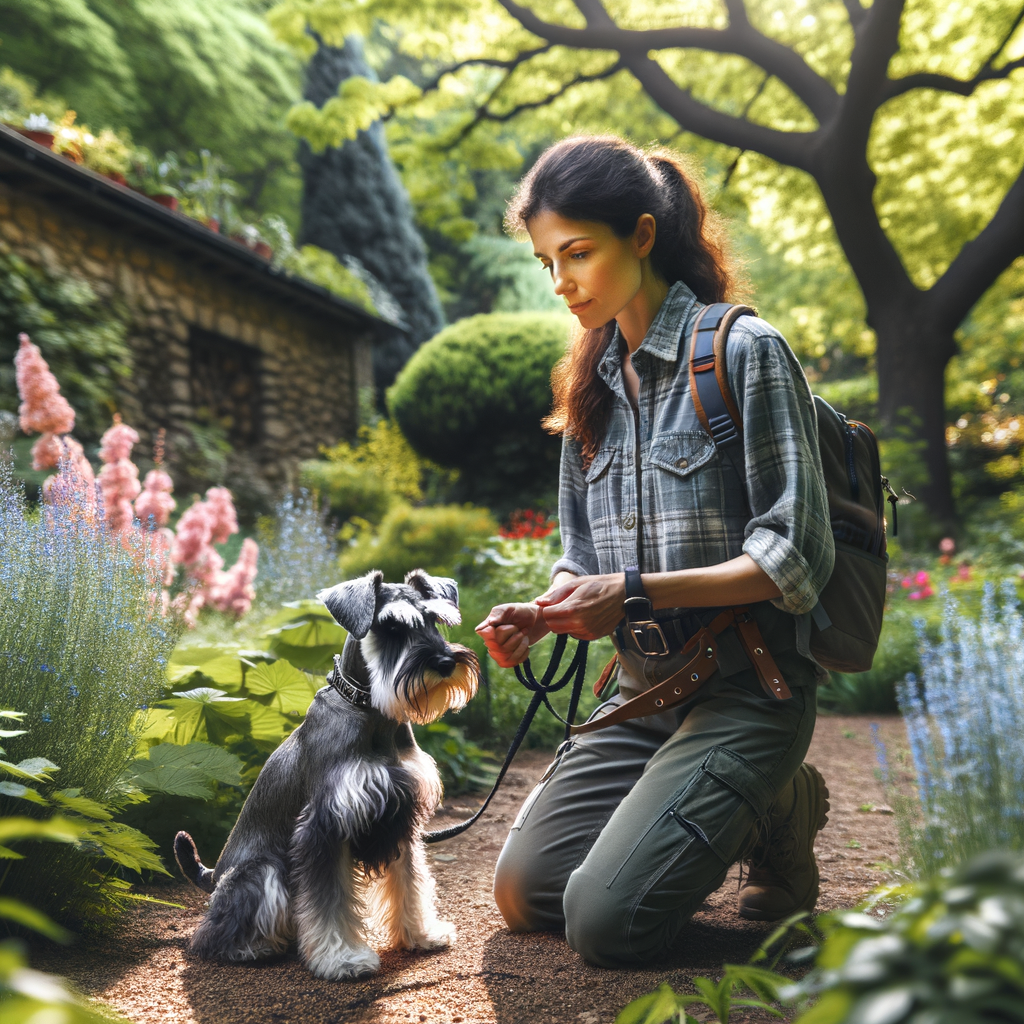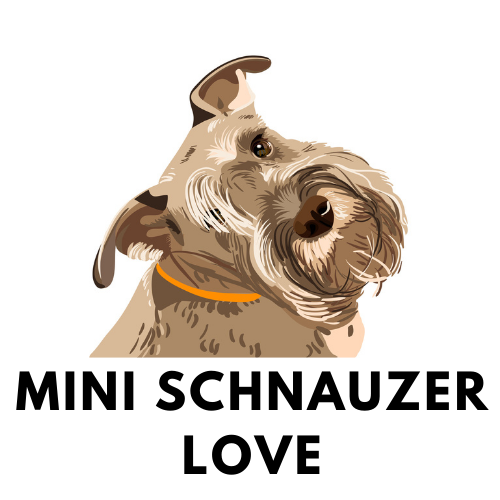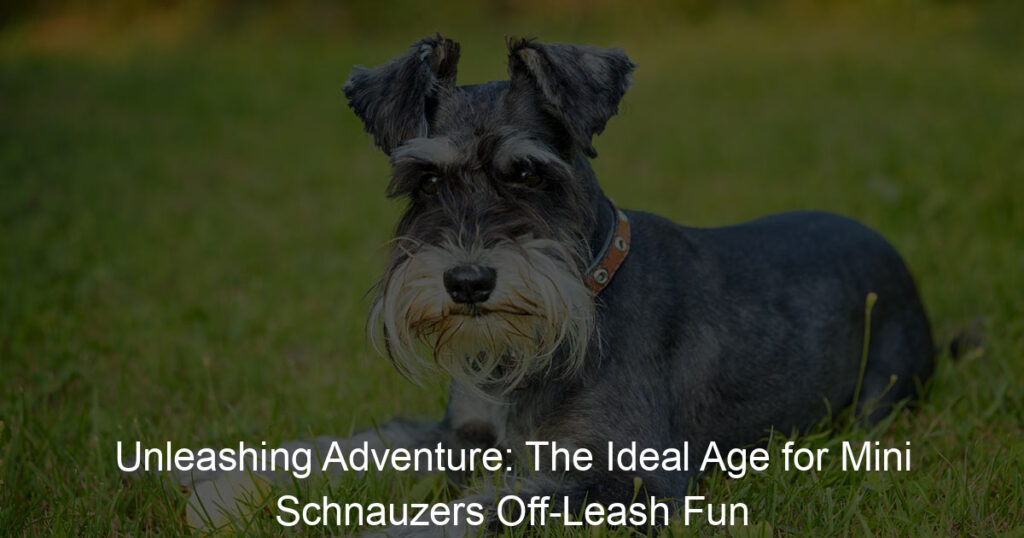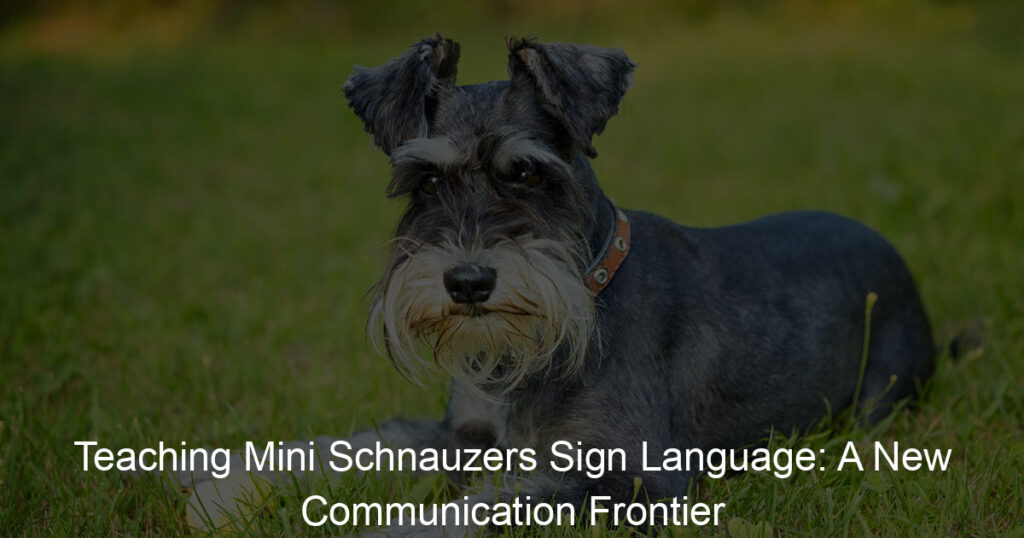
Introduction to Mini Schnauzers and Off-Leash Adventures
Welcome to our comprehensive guide on Mini Schnauzers and their off-leash adventures. This guide is designed to provide you with all the necessary information about this unique breed and how to make their outdoor adventures more enjoyable and safe.
- Overview of Mini Schnauzers breed
- Introduction to off-leash adventures for dogs
Miniature Schnauzers, often referred to as Mini Schnauzers, are a popular breed known for their distinctive looks and energetic personalities. Originating from Germany, these small but robust dogs are recognized for their square-shaped build, bushy eyebrows, and iconic beards. They are part of the Terrier group, known for their alert and spirited nature.
Mini Schnauzers are intelligent, lively, and eager to please, making them excellent companions. They are also known for their protective nature, often acting as watchful guardians for their families. Despite their small size, they are full of energy and require regular exercise to keep them healthy and happy.
Off-leash adventures refer to outdoor activities where dogs are allowed to explore freely without being restrained by a leash. These adventures can include walks, hikes, or playtime in designated off-leash parks or areas. They offer dogs a unique opportunity to explore their surroundings, interact with other dogs, and exercise in a more natural and unrestricted way.
However, off-leash adventures require responsible handling. Not all dogs are suitable for off-leash activities, and even those that are need proper training to ensure they can respond to commands and behave appropriately in different situations. For Mini Schnauzers, with their high energy levels and curiosity, off-leash adventures can be a great way to stimulate both their bodies and minds, but it’s important to ensure they are well-trained and ready for the experience.
Understanding the Right Age for Dog Training
Training your dog is an essential part of pet ownership. But when is the right time to start? The age of your dog plays a significant role in the success of the training. Let’s delve into the importance of age in dog training and general age guidelines for training dogs.
- Importance of age in dog training
- General age guidelines for training dogs
The age of your dog can greatly influence the effectiveness of training. Puppies are like sponges, ready to absorb and learn new things. Training at a young age can help shape their behavior and habits. However, it’s important to note that very young puppies may not have the attention span for prolonged training sessions. On the other hand, older dogs can also be trained, but it may take more time and patience as they may have already developed certain habits.
Generally, training can begin as soon as your puppy has settled into their new home. At around 8 weeks old, you can start with simple commands like ‘sit’, ‘stay’, and ‘come’. More complex training, like off-leash training, can start when the puppy is around 5-6 months old. Remember, every dog is unique and these are just guidelines. The most important thing is to make training a positive and enjoyable experience for your dog.
In conclusion, the right age for dog training can vary. It’s never too early or too late to start training your dog. The key is to understand your dog’s capabilities and to train at a pace that is comfortable for them. Stay tuned for our next section where we will discuss when to start training Mini Schnauzers specifically.
Mini Schnauzers Training: When to Start
Training your Mini Schnauzer is an essential part of their development and well-being. But when is the right time to start? Let’s delve into this topic.
- Specific age considerations for Mini Schnauzers
- Benefits of early training for Mini Schnauzers
Mini Schnauzers are intelligent and quick learners. They can start basic obedience training as early as 8 weeks old. However, more complex training, like off-leash adventures, should ideally begin around 6 months of age. This is when they are more capable of understanding and following commands. Remember, every Mini Schnauzer is unique, and their readiness for training can vary.
Starting training early has several benefits. It helps establish good behavior and habits, making your Mini Schnauzer a joy to live with. Early training also strengthens the bond between you and your pet, fostering trust and understanding. Moreover, it provides mental stimulation for your Mini Schnauzer, keeping them happy and healthy. Lastly, early training can help prevent potential behavioral issues in the future.
Training your Mini Schnauzer is a rewarding journey. By understanding the right age to start and the benefits of early training, you can ensure a successful and enjoyable training experience for both you and your Mini Schnauzer.
Introducing Mini Schnauzers to Off-Leash Training
Training your Mini Schnauzer to walk off-leash can be a rewarding experience for both you and your furry friend. Not only does it provide a sense of freedom, but it also allows your dog to explore and engage with their environment in a new way. However, it is important to approach off-leash training with care and patience. Here, we will discuss the steps to introduce Mini Schnauzers to off-leash training and address common challenges and solutions.
- Steps to Introduce Mini Schnauzers to Off-Leash
1. Basic Obedience Training: Before you can begin off-leash training, your Mini Schnauzer should have a solid foundation in basic obedience commands like ‘sit’, ‘stay’, and ‘come’. This will ensure they listen to you even when they’re not on a leash.
2. Gradual Introduction: Start by letting your Mini Schnauzer off the leash in a safe, enclosed area. This allows them to get used to the feeling of being off-leash while still being in a controlled environment.
3. Distraction Training: Once your Mini Schnauzer is comfortable off-leash in a controlled environment, introduce distractions. This could be other dogs, people, or toys. The goal is to train your dog to listen to you, even in a distracting environment.
4. Consistent Practice: Consistency is key when it comes to off-leash training. Make sure to practice regularly and reward your Mini Schnauzer for good behavior.
- Common Challenges and Solutions
Training a Mini Schnauzer for off-leash adventures can come with its own set of challenges. Here are some common issues and how to tackle them:
1. Distraction: Mini Schnauzers are naturally curious and can easily get distracted. If your dog is having trouble focusing, try using high-value treats or their favorite toy to regain their attention.
2. Fear or Anxiety: Some Mini Schnauzers may feel anxious or scared when off-leash for the first time. It’s important to take things slow and provide plenty of positive reinforcement to help them feel secure.
3. Stubbornness: Mini Schnauzers are known for their stubborn streak. If your dog is refusing to listen, don’t get frustrated. Instead, try changing up your training techniques or consult with a professional dog trainer for advice.
Remember, every dog is unique and what works for one might not work for another. The key is to be patient, consistent, and positive throughout the training process.
Off-Leash Training Techniques for Mini Schnauzers
Training your Mini Schnauzer to be off-leash can be a rewarding experience. It allows your dog to explore their surroundings freely, while still being under your control. There are several techniques you can use to train your Mini Schnauzer to be off-leash. Let’s start with the basic techniques.
Basic Techniques
Before you can start advanced off-leash training, you need to master the basics. These are the foundation of all other training techniques. They help your dog understand what you expect from them when they are off-leash.
- Command Training
- Recall Training
Command training is the first step in off-leash training. This involves teaching your Mini Schnauzer basic commands like “sit”, “stay”, and “come”. These commands are essential for keeping your dog safe when they are off-leash. For example, if your dog is about to run into a busy street, a well-timed “stay” command can save their life.
Recall training is teaching your dog to come to you when called. This is one of the most important skills for an off-leash dog. It allows you to regain control of your dog in potentially dangerous situations. To train your Mini Schnauzer in recall, start in a safe, enclosed area. Call their name and reward them with treats and praise when they come to you. Gradually increase the distance and distractions as they get better at recall.
Remember, patience and consistency are key in training. It may take time, but with regular practice, your Mini Schnauzer will learn to respond to your commands even when they are off-leash.
Advanced Techniques
Now that we’ve covered the basics, let’s dive into some more advanced off-leash training techniques for your Mini Schnauzer. These techniques will help your furry friend become more confident and responsive when off the leash, even in challenging situations.
- Distance Training
Distance training is all about teaching your Mini Schnauzer to respond to your commands from a distance. This is crucial for off-leash adventures, as it ensures your dog can still follow your instructions even when they’re not right by your side.
Start by practicing basic commands like ‘sit’, ‘stay’, and ‘come’ at a short distance. Gradually increase the distance as your dog gets more comfortable. Remember, patience is key! It might take some time, but with consistent practice, your Mini Schnauzer will eventually learn to respond to your commands from afar.
- Distraction Training
Distraction training is another advanced technique that’s particularly useful for off-leash training. The goal here is to teach your Mini Schnauzer to stay focused on you and your commands, even when there are distractions around.
Start by introducing mild distractions during your training sessions, like a toy or another pet. Give your dog a command and reward them when they follow it despite the distraction. As your dog gets better at this, you can introduce more challenging distractions, like other dogs or people.
Remember, the key to successful distraction training is to make sure your dog is always set up for success. Don’t introduce too many distractions too quickly. Take it slow and steady, and always end each training session on a positive note.
By mastering these advanced techniques, your Mini Schnauzer will be well-prepared for exciting off-leash adventures. Remember, training should always be a fun and rewarding experience for both you and your dog. Happy training!
Off-Leash Adventures for Mini Schnauzers
Off-leash adventures are a fantastic way to let your Mini Schnauzer explore the world around them. These adventures can provide numerous benefits for your furry friend, but it’s important to take certain precautions to ensure their safety. Let’s delve into the details.
- Benefits of off-leash adventures for Mini Schnauzers
- Exercise: Running around freely allows your Mini Schnauzer to get plenty of exercise, which is essential for their health.
- Mental Stimulation: Exploring new environments off-leash provides mental stimulation, keeping your dog’s mind sharp and active.
- Socialization: Off-leash adventures often involve meeting other dogs and people, which can help your Mini Schnauzer become more social and friendly.
- Training Opportunities: Off-leash time can be used to practice recall and other commands, enhancing your dog’s training.
- Precautions to take during off-leash adventures
- Choose the Right Environment: Not all areas are safe for off-leash adventures. Choose places that are fenced, away from traffic, and not too crowded.
- Monitor Your Dog: Always keep an eye on your Mini Schnauzer to ensure they’re not getting into trouble or wandering too far away.
- Keep Them Vaccinated: Ensure your dog is up-to-date on all vaccinations to protect them from diseases they might encounter while exploring.
- Recall Training: Your Mini Schnauzer should have a strong recall command before going on off-leash adventures to ensure they come back when called.
Off-leash adventures can be a wonderful experience for your Mini Schnauzer. Here are some of the key benefits:
While off-leash adventures can be fun, it’s crucial to ensure your Mini Schnauzer’s safety. Here are some precautions to consider:
In conclusion, off-leash adventures can be a great way to enrich your Mini Schnauzer’s life, provided you take the necessary precautions. So why not start planning your next adventure today?
Case Studies: Mini Schnauzers Off-Leash Training Success Stories
Let’s delve into some real-life examples of Mini Schnauzers who have successfully transitioned to off-leash adventures. These case studies will provide you with insights into the process and the potential challenges that may arise during off-leash training.
-
Case Study 1: Mini Schnauzer’s Successful Transition to Off-Leash
Meet Max, a spirited Mini Schnauzer who loved to explore. His owners were initially apprehensive about off-leash training, fearing he might run off. However, they decided to give it a try, starting with short, supervised off-leash periods in a secure area.
Max’s owners used positive reinforcement techniques, rewarding him with treats and praise whenever he responded to their commands. Over time, Max learned to stay within a certain distance of his owners, even when off-leash. His successful transition is a testament to the effectiveness of patient, consistent training.
Training Duration Training Technique Outcome 6 months Positive reinforcement Successful off-leash transition -
Case Study 2: Overcoming Challenges in Off-Leash Training
Next, we have Bella, a Mini Schnauzer with a stubborn streak. Bella’s owners found it difficult to keep her attention during off-leash training. She was easily distracted and would often ignore commands.
They decided to enlist the help of a professional dog trainer. The trainer introduced a clicker, a tool that makes a distinct sound to signal to the dog that a reward is coming. This method helped Bella associate the sound with positive behavior. Despite the initial challenges, Bella eventually mastered off-leash training.
Training Duration Training Technique Outcome 1 year Professional training with a clicker Successful off-leash transition despite initial challenges
These case studies highlight the importance of patience, consistency, and the right training techniques in successfully transitioning your Mini Schnauzer to off-leash adventures. Every dog is unique, and what works for one might not work for another. However, with the right approach, your Mini Schnauzer can enjoy the freedom and excitement of off-leash exploration.
Conclusion: Unleashing the Adventure in Your Mini Schnauzer
As we come to the end of our journey, it’s time to reflect on the key insights we’ve gained about off-leash training for Mini Schnauzers. This training is not just about giving your dog freedom, but it’s also about tapping into their adventurous spirit and enhancing their overall well-being.
- Recap of the importance of off-leash training for Mini Schnauzers
- Final thoughts and encouragement for owners
Off-leash training is crucial for Mini Schnauzers. It allows them to explore their surroundings, exercise their natural instincts, and enjoy a sense of freedom. It also fosters trust and strengthens the bond between you and your furry friend. Remember, a well-trained Mini Schnauzer is a happy and confident one.
Training your Mini Schnauzer to be off-leash may seem like a daunting task, but with patience, consistency, and the right techniques, it’s entirely achievable. Don’t be discouraged if progress seems slow. Every dog learns at their own pace, and your Mini Schnauzer is no exception. Celebrate the small victories and keep moving forward. Your dedication will pay off when you see your Mini Schnauzer confidently exploring the world, secure in their training and in their bond with you.
In conclusion, off-leash training is a rewarding journey that opens up a world of adventure for your Mini Schnauzer. It’s a journey that requires commitment and patience, but the end result is well worth the effort. So, are you ready to unleash the adventure in your Mini Schnauzer? The journey starts now!














